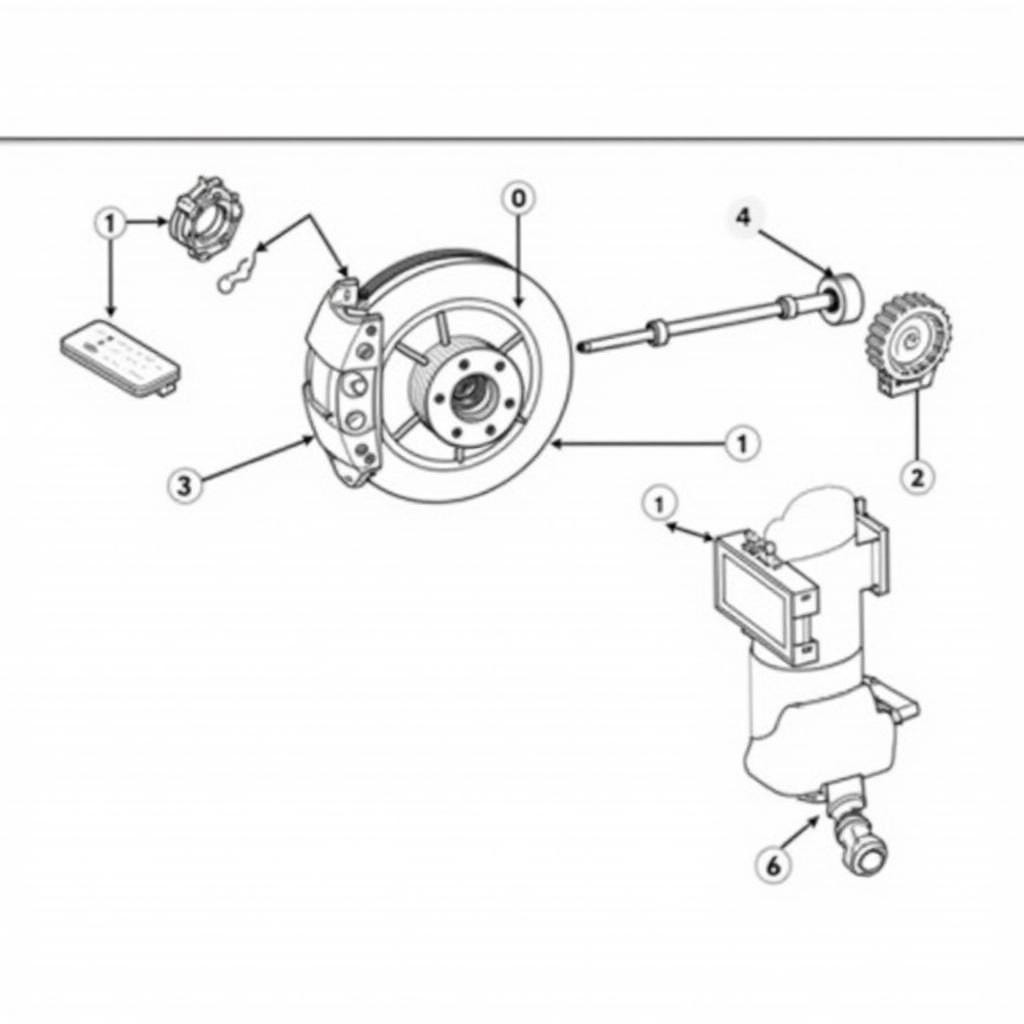The dreaded Hyundai Getz brake warning light – a beacon of potential trouble that can leave drivers feeling uneasy. Whether it’s a steady glow or an intermittent flicker, this light signals a problem within your braking system that demands attention. This article will delve into the common causes of the Hyundai Getz brake warning light, providing practical troubleshooting steps and solutions to help you get back on the road safely.
Understanding Your Hyundai Getz Brake System
Before diving into troubleshooting, it’s essential to understand the basic components of your Hyundai Getz braking system. This system is a complex network designed to slow or stop your vehicle, and it relies on the harmonious interaction of several key parts, including the brake pedal, master cylinder, brake lines, brake calipers, brake rotors, and brake pads. The brake warning light acts as a crucial communication channel, alerting you to potential issues within this intricate system.
Common Causes of the Hyundai Getz Brake Warning Light
There are several reasons why your Hyundai Getz brake warning light might illuminate. Some of the most common culprits include:
- Low Brake Fluid: This is often the most straightforward cause. Low brake fluid can indicate a leak in the brake lines or a worn-out master cylinder.
- Worn Brake Pads: Brake pads are designed to wear down over time. When they become too thin, the brake warning light will activate to signal the need for replacement.
- Faulty Brake Sensor: A malfunctioning brake pad wear sensor can trigger the warning light even if the brake pads are still in good condition.
- Issues with the ABS (Anti-lock Braking System): Problems within the ABS system, such as a faulty sensor or control module, can also illuminate the brake warning light.
- Parking Brake Engaged: Sometimes, the simplest explanation is the correct one. Ensure the parking brake is fully released.
 Hyundai Getz Brake System Components Diagram
Hyundai Getz Brake System Components Diagram
Troubleshooting the Hyundai Getz Brake Warning Light
If your brake warning light comes on, don’t panic. Here’s a step-by-step guide to help you troubleshoot the problem:
- Check the Parking Brake: Make sure the parking brake is fully disengaged.
- Inspect the Brake Fluid Level: Locate the brake fluid reservoir under the hood and check the fluid level. If it’s low, add the correct type of brake fluid as specified in your owner’s manual.
- Examine the Brake Pads: Visually inspect the brake pads through the wheel spokes. If they appear thin or worn, it’s time for a replacement.
- Check for Leaks: Look for any signs of brake fluid leaks around the brake lines, calipers, and master cylinder.
- Scan for Diagnostic Trouble Codes (DTCs): If the problem persists, using an OBD-II scanner can help pinpoint the specific issue by retrieving diagnostic trouble codes.
Solutions and Repairs
Depending on the diagnosed issue, the necessary repairs may range from simple DIY tasks to more complex procedures requiring professional assistance.
- Low Brake Fluid: Topping off the brake fluid is a quick fix, but if the level drops again quickly, it indicates a leak that needs immediate professional attention.
- Worn Brake Pads: Replacing brake pads is a relatively straightforward job that can be done at home with basic tools.
- Faulty Brake Sensor: Replacing a faulty brake sensor is also a manageable DIY task.
- ABS Issues: Problems with the ABS system are best handled by a qualified mechanic.
“Regular brake system inspections are crucial for preventing major issues,” says John Smith, ASE Certified Master Technician. “Catching problems early can save you time, money, and ensure your safety on the road.”
Conclusion
The Hyundai Getz brake warning light is a vital safety feature that should never be ignored. By understanding the common causes and following the troubleshooting steps outlined in this article, you can address the issue effectively and keep your braking system in optimal condition. Remember, a properly functioning brake system is essential for your safety and the safety of others on the road. Don’t hesitate to consult a qualified mechanic if you’re unsure about any aspect of brake system maintenance or repair.
FAQ
-
How often should I check my brake fluid level? It’s recommended to check your brake fluid level at least once a month.
-
How long do brake pads typically last? Brake pad lifespan varies depending on driving habits and conditions, but they generally last between 25,000 and 70,000 miles.
-
Can I drive my Hyundai Getz with the brake warning light on? While it might be possible to drive a short distance, it’s strongly discouraged. Driving with a lit brake warning light can be dangerous and could lead to further damage.
-
Is it expensive to fix brake problems on a Hyundai Getz? The cost of repairs varies depending on the specific issue. Simple fixes like topping off brake fluid or replacing brake pads are relatively inexpensive, while more complex repairs like ABS module replacement can be more costly.
-
What type of brake fluid should I use in my Hyundai Getz? Consult your owner’s manual for the correct type of brake fluid recommended for your specific model year.
-
How can I prevent future brake problems? Regular maintenance, including brake inspections and fluid changes, is the best way to prevent brake problems.
-
What should I do if my brake pedal feels spongy? A spongy brake pedal can indicate air in the brake lines or a problem with the master cylinder. Consult a mechanic immediately.
